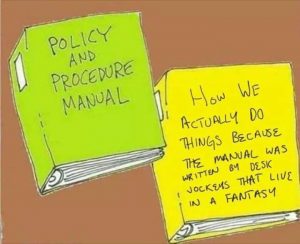
Working for a multi-billion dollar corporation puts you at an extreme disadvantage if, somewhere along the line, you and the company should have a disagreement. After all, the company employs a whole department of legal professionals in every legal area in which they presently or may operate. This vast network also has all the consultants, advisors, paralegals, and clerical staff to make sure he company is protected from any kind of malfeasance, negligence, or responsibility in the things it does to do business in the manner they see fit. This means externally, with customers, regulators, municipalities, and state and federal government officials; as well as internally, like dealing with unions, contracts, and employees.
In furtherance of the latter, the company’s legal teams weave a web, or “matrix”, of company policies, programs, and guidelines that you, as an employee, must follow when doing your job. Each one of these rules and regulations form a gauntlet you have to run each day as an employee, and are usually cloaked with religious fervor under the word and term, “SAFETY.”
Trouble is, almost NO HUMAN can know, adhere, and navigate this “matrix” and get any job done. The company knows this because they designed the system to ensnare you if something should happen while you are at work. No matter how conscientious, responsible, or cautious you may be, it only takes one slip to start a chain of actions that, in the end, will ALWAYS find YOU at fault.
If there is one and only one reason why it’s so important to have a union, this is it!
 Without a union, you can sue the company. In the end you’ll end up terminated, usually for no cause, and then spend the next decade fighting them in court until any settlement you reach will be a zero sum gain after the lawyers and creditors you couldn’t pay while fighting come looking to collect. This happens all the time, and especially so among large corporations.
Without a union, you can sue the company. In the end you’ll end up terminated, usually for no cause, and then spend the next decade fighting them in court until any settlement you reach will be a zero sum gain after the lawyers and creditors you couldn’t pay while fighting come looking to collect. This happens all the time, and especially so among large corporations.
A union will bring all the resources, local, national, and even international that they have in coming to your defense, and, if not successful, protect your job and assist the private counsel if you decide to fight on your own.
Take the time to study your Personal Safety Manual, and read up on the tenants of Human Performance and behavior based safety. After you get done with that, pull up the company’s Corporate Policy Letters, and take a closer look at the “safety” programs they have published for all employees too see.
The company is betting you won’t bother, which is why one of the first statements to employees is that ignorance of this material is no excuse for violating any of them.
Think about this the next time you tag something out, or put a wrench on a bolt, or have to fill out a form for line breaking or hot work. Confined spaces and equipment operating procedures are perfect examples of signatures being more important than safety. How many liquid transfer papers do operators fill out for lime, urea, acid, oil, hydrogen, and other bulk deliveries.
Each one is a potential grenade that could go off in the hand of the person holding it.
